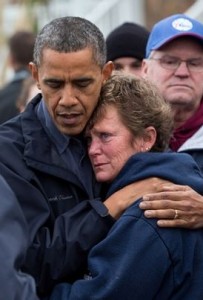
Almost all of the energy in our public rhetoric is reserved for unmasking what appears to many as the unjustified and self-serving optimism of political elites.
Anyone listening to any past president surely noticed that their public rhetoric was in a distinctly different key. Assuming that Donald Trump is a one-off anomaly, presidents speak in major chords that emphasize positivity, success, praise, enduring values, and always a degree of hope. It’s the nature of the office to be affirming. But such rhetoric is increasingly at odds with the sour and minor keys that tend to dominate the ‘rough music’ that comes with significant national and political events. It can hardly be news that irony and suspicion rule our airwaves, talk shows, blogs, news sites, and twitter feeds.
It’s clear to anyone who is listening that we live in an era dominated by oppositional rhetoric. The cultural voices that command the greatest attention are mostly reactive, negative and frequently vitriolic. Almost of this energy goes into unmasking what appears to so many as the unjustified and self-serving optimism of political and corporate elites. Increasingly, the negativity of the internet troll looks less like an isolated aberration than a new and durable rhetorical norm. As a younger student of political communication in the 1970s, I don’t recall seeing the plethora of books asserting presidential conspiracies than can now be found among the “new releases” on the shelves of our public libraries. And there is, of course, the current President’s daily vitriol. It’s hardly news that he excels at making nasty comments.
How did we get here? A bit of this effect is a matter of perception. The Democratic strategist Tony Schwartz noted years ago that in a simple election between two people there are actually four voting choices; a person can vote for or against either candidate. Schwartz noted that it was sometimes easier to help people discover who they were against. That insight was enough for him to produce devastating anti-Goldwater ads in the 1964 presidential contest.
In addition, the democratization of news gathering—or at least news commentary—means we hear less from official voices and more from dissenters. Presidents can no longer easily command broadcasters to turn over prime time for an important speech. The media competition for attention is too great. At the same time, more of our informational sources have merged straight reporting of public events with the entertainment imperative of centering a program on a host who can issue slicing rebukes. We expect our news with the twist of irony that comes easily in The Daily Show, Real Time with Bill Maher, or online outlets like Slate or Salon.com. As for talk radio: outside of NPR, no one seems to want to sound like a good-government wonk from Minnesota. A surer route to success is to become the audio equivalent of a professional wrestler tossing unworthy adversaries over the ropes.
In actual fact, as psychologist Stephen Pinker has noted in The Better Angels of Our Nature (Penguin, 2012), we are a somewhat more compassionate society than the one our ancestors knew. But it also seems apparent that we have less interest in advocates motivated to find common ground in civil discourse. This splintering of the culture is thus partly the effect of more decentralized and polarized news media, but it’s also caused by a cultural turn away from the communitarian trope that was proudly uttered in defense of significant advances in social welfare legislation following World War II. The G.I. Bill, Social Security, and the civil rights acts of the mid-1960s were milestones as enactments of this value, which could be summarized as broad support to use the political resources of the nation for the benefit of all. In this common pre-Reagan belief, government was the solution, not the problem.
The challenge posed by the newer turn toward a more atomized and suspicious culture is whether we and other western democracies can maintain a sense of shared national destiny. With a fragmented nation now served by fragmented media, finding what unites us is more difficult. That search is compounded by the fact that we no longer pay much attention to Presidents, even when they yearned to be the poets of our national spirit.
